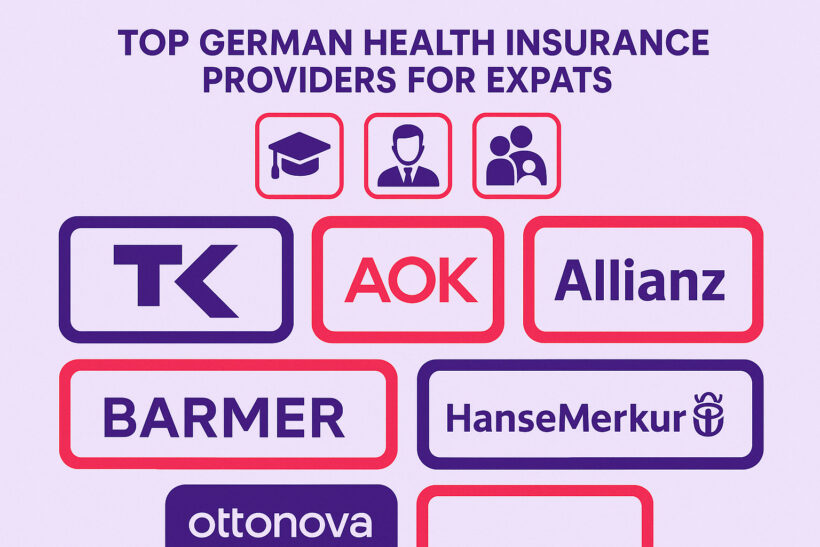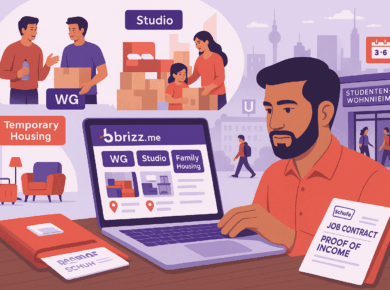Dear readers,
If you’ve just landed in Germany and looking for health insurance in germany—congrats! 🎉 Welcome to the land of 🍺 beer, 🥨 pretzels, and……………. 🥁🥁 INSURANCE!!!!!
In Germany, insurance isn’t just a “good idea.” It’s practically a lifestyle. You need insurance to breathe………Okay, not literally—but almost.
There’s an insurance for everything:
- Break someone’s stuff? That’s Haftpflichtversicherung (personal liability insurance).
- Need a lawyer? Say hello to Rechtsschutzversicherung (legal insurance).
- Rent an apartment? Yep, probably need another one. And of course—the big boss of them all—
- health insurance (aka Krankenversicherung). The OG. The mandatory one.
Without it, you could end up getting:
- A €5,000 hospital bill for appendicitis.
- €300 for a basic doctor visit.
- A big, fat nein (NO) when applying for your residence permit, residence permit extension, job, or apartment.
- + Late insurance fees when you finally sign up!
So, Never skip insurance—it’s illegal and financially disastrous.
But don’t panic—we’ll walk you through it, the Brizz.me way: Fun. Clear. Totally insider. Let’s get you covered. 😎
Public vs. Private Health Insurance in Germany (GKV vs. PKV)
Germany has two main flavors of health insurance:
Public Health Insurance (Gesetzliche Krankenversicherung — GKV)
About 73% of people in Germany are covered by Public Health Insurance (GKV), making it the most common choice for residents. Contributions are income-based, around 14–15% of gross salary (split roughly equally between employee and employer).
GKV provides comprehensive coverage, including doctor visits, hospital stays, prescriptions (small co-pay), preventive checkups, pregnancy and childbirth care, and basic dental treatment. Family insurance often covers children and non-working spouses for free, making it especially attractive for families. Many insurers also run bonus programs that reward healthy behaviors, such as gym memberships, dental cleanings, health apps, and smoking cessation, sometimes paying €30 or more annually for completing preventive checkups. Some popular public insurers include:
Private Health Insurance (Private Krankenversicherung — PKV)
Private insurance can feel fancy but comes with fine print. Premiums are calculated individually based on age, health status, and coverage level, rather than income, and can increase significantly with age.
PKV typically provides enhanced services, including single hospital rooms, private doctors, and higher dental coverage. It can be a good choice for young, healthy, high-earning individuals who want faster service and more flexibility. However, family members are not automatically covered, and switching back to public insurance later can be extremely difficult.
PKV premiums are often partially tax-deductible, but careful planning is required to balance cost and long-term benefits. Popular private insurers include:
How Can Expats Get Health Insurance in Germany
Getting health insurance in Germany is essential for visas, work contracts, and apartment rentals. Here’s a step-by-step guide for foreigners:
- Have a German address and bank account – These are prerequisites for both public (GKV) and private (PKV) insurance.
👉Read our blog on Anmeldung and Banking system in Germany
- Decide between public or private insurance – Consider your income, age, family situation, and long-term plans.
- Apply online or through an insurance broker – Many providers now allow fully digital insurance applications. Simply log in to your Brizz.me account to find a trusted insurance broker or consultant in your area. If the process feels confusing, a certified insurance advisor can help you choose the right coverage for your needs. Brizz.me connects you with experienced insurance experts who can guide you toward a better, well-informed decision. Prepare and submit required documents:
- Passport
- Visa or residence permit
- Job contract (for employees) or university enrollment letter (for students)
Once approved, you will receive your Versicherungsnachweis, the official proof of health insurance. This document is mandatory for visa applications, employment contracts, and rental agreements, and it ensures you meet Germany’s legal health coverage requirements.
👉 Apply online here:
Pregnancy and Health Insurance in Germany
Pregnant in Germany? Congratulations — and breathe easily.
If you’re pregnant in Germany, both public (GKV) and private (PKV) health insurance provide comprehensive coverage, so you can focus on your pregnancy without worrying about hidden costs. Public insurance typically covers prenatal checkups, ultrasounds, midwife care, delivery costs, hospital stays, prenatal classes, and basic postnatal care, with newborns automatically included under family insurance.
Private insurance often adds enhanced benefits, such as private maternity rooms, additional checkups, personalized care from the hospital doctor of your choice, and expanded postnatal support, depending on your plan. Both systems ensure that essential services for mother and baby are fully covered, making pregnancy in Germany financially secure and medically supported.
Brizz.me’s Secret Tips
Start with public insurance if unsure—it’s safe & affordable. Private insurance can be awesome if you’re young & wealthy. Check your insurer’s bonus programs:
- Earn cash for health checkups
- Get reimbursements for fitness apps
- Save on dental cleanings
Many insurers have English-speaking hotlines or apps—lifesaver if your German is still wobbly.
Germany’s health system is top-notch—but only if you’re part of it. So, get yourself insured, and then go enjoy the German bratwurst and bier. 🍻
👉 Don’t forget to check out my new blog on how to use the health insurance like a pro!
If you have any questions or request for a new blog, scribble it on the comments sections or mail me on diya@ananthya.com.
Until next time,
Diya








